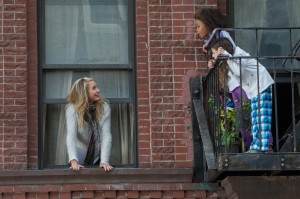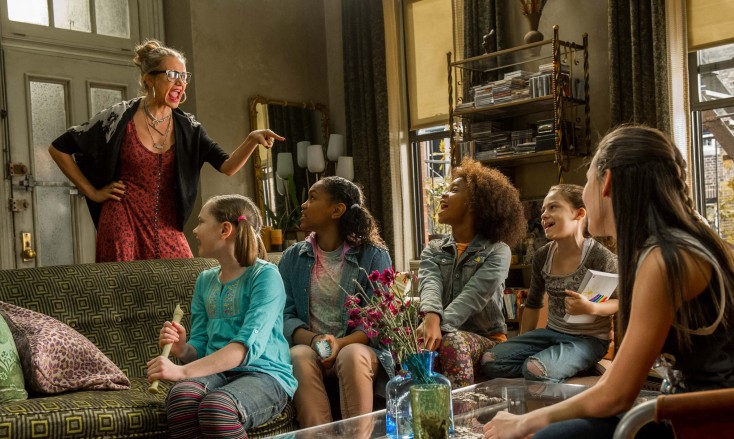
Miss Hannigan (Cameron Diaz) with Annie (Quvenzhané Wallis) and Mia (Nicolette Pierini) in Columbia Pictures’ ANNIE. ©CTMG. CR: Barry Wetcher.
By ANGELA DAWSON
Front Row Features
NEW YORK—Cameron Diaz was just 10 years old when the original big screen adaptation of the hit Broadway musical “Annie” hit theaters. Who’d have thought some 30 years later, she would be playing the abusive Miss Hannigan herself in an updated big screen Hollywood adaptation?
The 42-year-old actress says that while she did have some initial trepidation about tackling such a beloved musical, she liked that it was made contemporary and was eager to try singing and dancing in a big Hollywood musical.
Based on the classic syndicated comic strip “Little Orphan Annie,” by Harold Gray, “Annie” the musical tells the story of a spunky little girl abandoned by her parents as a baby, and raised by a mean foster mother (Diaz’s Miss Hannigan). A rich and ambitious mayoral candidate (Academy Award winner Jamie Foxx) takes guardianship of her, initially for political reasons, but winds up being won over emotionally by the happy-go-lucky little girl (“Beasts of the Southern Wild’s” Quvenzhane Wallis).
Diaz, who is single and child-free, explained what appealed to her about the part of Miss Hannigan, becoming part of a whole new “Annie” iteration and how she plans to spend 2015.[prviate]
Q: There’s a line in the movie that says, “Luck sucks.” You’ve come on a tremendous journey. Do you feel that luck sucks, or have you depended on something else? Some have depended on hard work, while others have counted on blessings.
Diaz: I think it’s all the same. I think it’s all in your perspective that you look from. For me, I work my butt off, but I feel lucky and I feel blessed. I don’t feel like I got anything because I was only lucky and only blessed. I got it because I worked my butt off for it, too. I think it’s all the same thing, and it’s just… nothing happens without any of those three things.
Q: Can you speak about collaborating with producer/director/co-writer Will Gluck (“Easy A,” “Friends with Benefits”), and what do you admire about him?
Diaz: He’s just so much fun, and fun to mess with, and have fun with. He’s a great guy.
Q: Did he give you a lot of space to play and express yourself?
Diaz: Yeah, totally, especially when you are working with the kids, because he never cut. He kept (the camera) rolling constantly, because we only had a certain amount of time, so he would utilize that time by never cutting, because if he cut the kids would be running around, so the way he kept it going was by going, “We’re still rolling!” An hour later, we’d be talking away, and we’d be like, “Oh, we’re rolling.” You have to redo, figure out, and restart exactly where you were. It was really interesting, really fun challenge to do.
With this movie, it would’ve taken two years, literally. But in that, he used that as a way to keep momentum going, “Okay try this. Okay, try that. Go here.” So he kind of threw things at us, and we had to catch it and run with it, because we were still rolling.
Q: Can you speak about singing and dancing “Easy Street” with Bobby Cannavale, who plays your cohort Guy?
Diaz: We talked about that a lot, because all the other songs, all of a sudden, they just start singing. There’s a reason for us to be singing and dancing. It’s actually a musical number. And we had so much fun doing it. We rehearsed for three months, on the weekends. I was doing another movie. I was doing “Sex Tape,” in Boston, and coming down to New York, we were just doing that on the weekends. About a month in, we kind of went, “Oh, we have to sing, too.” We weren’t singing, and neither one of us had ever sang and danced together, and we were like, “We have to sing to each other.” So then we started adding, once we got the foot down, we were like, “Let’s start practicing. Let’s start rehearsing that part of it.” We were partners. That was the great thing, because he’d never danced before. He’s such a natural lead, he’s such a great partner, straightaway. You depend on that person, who’s throwing you, to catch you, and he was always there, and never once dropped. We just had such a fun time.
Q: At what point did you go, “Oh my God, I’m doing ‘Annie’!” Was that intimidating?
Diaz: Yes, it’s “Annie,” but it’s a completely different movie. Since it’s set in modern times, my Hannigan, his Guy, all the other characters, we’re giving performances for the generation that’s going to see it for the first time. It’s the only “Annie” they are going to know. When we are the age we were when we saw the original, those kids are going to watch this movie, and that’s going to be their original. Thirty years later, they might remake it, and they might go, “How come Annie’s Chinese? She’s supposed to be black.”
Q: You’ve played a bad teacher in “Bad Teacher,” and now you’re a horrible foster mom in this. Are you trying to tell us something?
Diaz: (laughing) Yes. Anytime you give me permission to yell at children, I will take it. Yeah, it’s fun. It’s fun yelling at kids. In between, I always made sure they were warm, and they were looked after. I was humane to them in real life. It’s just in the movies, if you give me permission… When they say, “Action!” I’m right there with it. It’s fun. Don’t even try to front like ya’ll don’t think it is, because it is.
Q: How is it playing such an iconic role? Did you go back and create a brand new thing, or did you look at Carol Burnett’s performance (in the 1982 version) and watch what she did?
Diaz: No. Because I really feel that it’s a completely different performance. It’s a different character for this generation. I feel like, also, my Miss Hannigan’s issues are different. Carol Burnett’s (Miss Hannigan) couldn’t get a man. She was drinking because she didn’t get married and didn’t have a man. And today, Miss Hannigan is drinking because she doesn’t have fame. It’s an epidemic in our society, that we have to look at how many (Facebook) Likes we have, and how many people follow us (on Twitter) to validate whether or not we are seen, or whether or not we are worthy of love. I just look at it like Hannigan is just a representation of that. It’s not until she learns that she’s worthy of love, and that the way she is treating those kids is the same way she’s treating herself, even worse maybe, inside. Until she learns how to love herself can she become who she truly is.
Q: How was it working with Quvenzhane Wallis who plays Annie in this? Was it difficult to be really mean to her?
Diaz: No, because she just laughed at me, literally she just laughed at me. I would go from, “Honey, you should wrap up and stay warm. Here, take my warm coat, sit in the car for a little bit.” And then they’re like, “Action!” and I’m like, “You little rascal!” She would just go, “Ha! Ha! Ha!” I would go, “I’m supposed to be mean! I’m supposed to be scary to you!” She didn’t buy it. I would ask, “Can you just act like you’re scared of me for once, when it’s my coverage. I need some help.”
Q: New York is such an important character in the film. I’d love to hear about New York, because you’re out on the streets, these aren’t stages. You’re immersed. Can you speak about that experience?
Diaz: It’s probably what you would expect. We had to create a space for everybody to do their job safely, to do what they do, and also keep the city running, and not get into too many people’s ways. I think those sets really allowed that. Even though we were in the city, those sets were kind of isolated. Like the World Trade Center, or just being on the streets, we’d use a little part of the street, up in Harlem or someplace. I think New York being a character in the movie; everything from the beginning, with the jackhammers, the sounds of New York becoming part of the music, to helicopters. (Foxx’s character mayoral candidate Will) Stacks showing Annie his New York, from the sky, to the chase, I just thought all those things were so well done, really showing New York in all its glory.
Q: Wasn’t it cold working on location during the winter?
Diaz: It was mad cold. There was one day, when (Foxx’s Stacks) handed Annie over to her parents, and we all—everybody in the cast— couldn’t speak. We all had this cold thing in our chest. We all lost our voices. We were like, “How are we going to do this? We’re going to have to dump the whole thing.” But everybody’s still giving their performance, knowing they’re going to have to go in and re-do it (in the recording booth). I had a frog in my throat the entire time. I had to re-do the whole thing.
Q: In talking to people of your generation, are they really excited about this movie, sharing this with kids now, because they grew up on the ’80s movie?
Diaz: Yeah, I think everybody’s really excited. I’ve set up a couple of screenings just for my friends and family and stuff, and it was really exciting for the parents. The parents were like, “We’re going to go see ‘Annie’!” and the kids are like, “What?”
Q: What are you doing next?
Diaz: (laughing) I’m taking a nap. Seriously, I’m writing a second book, a follow-up on “The Body Book” so that’s what I’m going to do all next year, just concentrate on that. Last year, I did three films and a book, and this year I promoted three films. I’m ready to just go into writing stage, sit a lot in front of my computer, and shuffle in the kitchen, cook something and then shuffle back.
Q: What’s the next book about?
Diaz: It’s on the biology of aging, so bio-gerontology. Instead of focusing on what’s happening on the exterior—it’s obvious what’s happening to us on the exterior—it’s about the interior and what we’re putting in. Kale is a big part of it.[/private]





